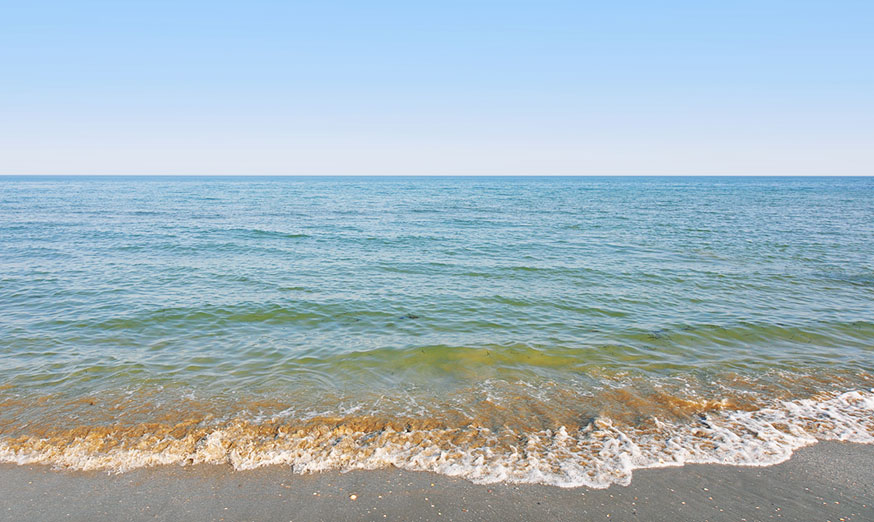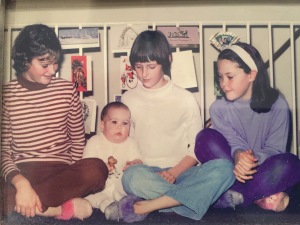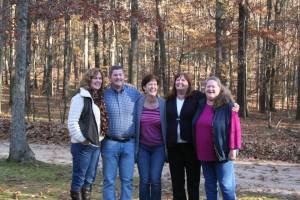
Tides
I’ve been watching the tides at the beach this week, the relentless ebb and flow onto the shelly, sandy shore (say THAT three times, fast). When you’re lazing on the sand, propped up with a book and cold drink, the sea’s rhythm soothes and caresses like a mama with a sick child. There, there, my love, close your eyes and rest and you’ll feel all better soon.
It’s a different story if you’re out beyond the breakers. Despite growing up at the beach, spending a great deal of life in Florida, and having a house with a pool, my mother could not swim. I’m not sure just how she missed out on this life skill, especially given her environment, but there it is. She splashed in the shallows with all of us as children and made sure we could dive and swim with confidence, but she refused to even put her face in the water. She hid it well. I was not even aware of this lapse in her skillset until I was much older. I thought she was joking. “But I’ve seen you in the water,” I said. “You swim.” She shook her head. “I only pretend.”
After I graduated college, my mother and I went on a celebratory cruise, just us. As we island hopped around the Caribbean for several days, we were surrounded by water. She watched from the deck, sipping rum, as I swung off the pirate ship’s rope swing into the clear, blue sea. She watched from the shore while I splashed in the waves on horseback. Towards the end of our trip, we motored out to a small island off the coast of St. Maarten where our group was to spend the afternoon snorkeling over a reef. As the guide handed out fins and masks, he talked about the types of fishes we would see and the areas we should stay in. I was surprised when my mother started putting on the gear.
“I think I can do this,” she said. “It’s not that far off the shore, and I’ll have flippers.” Thrilled, I waded with her into the ocean and we practiced breathing through our snorkels and swimming around where we could still touch. Her face lit up when she spotted the schools of colorful tropical fish darting around the rocks. She pointed them out, gesturing wordlessly as our fins flapped.
The reef we were headed to was not that far, maybe a hundred yards or so. We floated on top of the ocean, bobbing with the waves, parallel to each other as we kicked our fins. It only took about ten minutes before we reached the rocky reef, but by the time we got there, the mood had changed. I noticed she was no longer eagerly searching for bright yellow schools of fish. I raised my head and treaded water, yelling to her where she sat like a nervous mermaid on top of the reef itself, something we weren’t supposed to do. She had yanked off her mask and was breathing hard.
“What? Are you done already?”
Then, for the first time in my life, I realized my mother was afraid. The whole way out we had been swimming against the tide, having to work for every bit of ground gained. The wonder and expectation of the reef had vanished. I had no idea how she’d even gotten on top of the reef at all given its rough surface, but she was there now, clutching the rock desperately. I’d seen her fearful for her children before, especially my brother who seemed to take special delight in racking up ER visits, but never for herself. Until that moment, to me she had been “mom,” the ever-present comforter and provider, who always knew what to do and how to fix it. Suddenly, in a few moments of offshore panic, she had become a person with limitations and fears.
I reasoned with her, the parent-child table turning in disorientation. “We are going to have to get back somehow. You can’t just stay out here.” She didn’t want me to alert the guide and call attention to herself, as if she wasn’t noticeable perched on top of the reef instead of snorkeling around it like everyone else. “I’ll help you,” I said. “You can hold on to me the whole way.” She reluctantly climbed off the rock, put her mask back on and let me swim her back to the shore. When she could touch bottom again, she was angry at herself. The swim back had been much easier, since we’d been going with the tide instead of against it. She admitted it was silly not to have snorkeled around the reef while she was out there. If she’d known it would be so much easier getting back, she wouldn’t have been afraid.
I offered to take her back out but she refused. She waded out and sat on the sand, afraid to try again. It’s one of the moments I remember most from our trip, being startled that my parents were real people in addition to being just my parents. You know, that normal 20’s smack in the head that most of us experience once we’ve outgrown our childish me-centric worldview. I kind of wish I’d had some easing into it, though, because it was truly a shock to my system that affected the remainder of that trip.
Why do parents try so hard to seem infallible to their children? Does it mean we love them more? Can protect them better? Do our words carry more weight? I don’t know any parent who’s played the “I’m perfect” card who is thereby more revered by their children. In fact, it’s mostly just the opposite. When we can be real to our children, confess that we don’t know something, we’ve messed up, we’re imperfect and have character flaws that we’re working on, our kids may just respond with more compassion and forgiveness than we knew they had. Have you ever told your child “I’m sorry, I was wrong”?
We think our children will hold us hostage when we admit truths about ourselves, but the reality is their respect for us grows. If they see us apologizing and working on our faults, it’s more likely they’ll do the same. If we can be humble and ask forgiveness from them, they might surprise us by how bottomless their little compassionate hearts are.
If, when they’re old enough, we can even let them hold us accountable on a thing or two, as an actual real person would with another actual real person, then we’ve really made some strides in the relationship.
I wish I’d fully appreciated my parents earlier. I’d probably have given them a break more, asked different questions, learned different lessons. But, like my mother, I was often content to stick with things the way they were, never imagining what was beneath the surface. I think we both learned something that afternoon. Sometimes the work it takes to swim against the tide rewards you in ways you never would have discovered had you just sat upon the shore.


 ting around watching TV when he got home from work, and the best time to ask mom for permission for something was when she was almost asleep in her chair.
ting around watching TV when he got home from work, and the best time to ask mom for permission for something was when she was almost asleep in her chair.